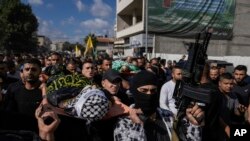The U.N. General Assembly is set to hold an emergency meeting Tuesday to debate a draft resolution demanding an immediate humanitarian cease-fire in Gaza.
The resolution expresses “grave concern over the catastrophic humanitarian situation in the Gaza Strip and the suffering of the Palestinian civilian population” and emphasizes the need to protect both Israeli and Palestinian civilians under international law.
It calls on all parties to comply with international law, and also demands the immediate release of all hostages and calls for ensuring humanitarian access.
A similar resolution failed in the U.N. Security Council last week due to a U.S. veto. There are no vetoes in the General Assembly, and while General Assembly resolutions are non-binding, they do carry political weight.
U.S. State Department spokesperson Matthew Miller explained the U.S. opposition to the Security Council resolution as he briefed reporters Monday.
"We've made clear that while we support humanitarian pauses, we think a cease-fire that would allow the leadership of Hamas, that plotted and planned October 7, to continue to carry on in Gaza and plan future attacks. That's unacceptable,” Miller said.
Ahead of Tuesday’s U.N. session, fighting continued in Gaza, including Israeli airstrikes in central and southern Gaza.
The Israeli military said its airstrikes were aimed at rocket launching sites throughout the Gaza Strip, and that ground troops had found 250 rockets, mortar shells and rocket-propelled grenades during a raid.
In the Israeli-occupied West Bank, the Palestinian health ministry said Israeli forces killed four Palestinians in the city of Jenin.
The Palestinian Red Crescent Society said the deaths were the result of an Israeli drone strike.
Around 270 Palestinians have been killed in the West Bank since the October 7 Hamas attack on Israel and the launch of the Israeli offensive to eradicate Hamas in the Gaza Strip.
The World Health Organization called Tuesday for the “protection of health care and humanitarian assistance in Gaza.” It cited difficulties a WHO team encountered while trying to deliver medical supplies to a hospital in Gaza City and to evacuate critically hurt patients, saying there were delays at military checkpoints and that workers from the Palestinian Red Crescent Society were detained.
“The people of Gaza have the right to access health care,” WHO Director-General Tedros Adhanom Ghebreyesus said. “The health system must be protected. Even in war.”
The U.N. humanitarian agency says that while limited aid deliveries are continuing in the Rafah area of southern Gaza, near the Egyptian border, the fighting has largely cut off other parts of Gaza from receiving aid.
Philippe Lazzarini, head of the U.N. agency for Palestinian refugees, visited Gaza Tuesday and described the situation there as “endless deepening tragedy” in a post on social media.
“People are everywhere, live in the street, need everything,” Lazzarini said. “They plead for safety and for an end to this hell on earth. Our colleagues are asked to do the impossible in what is an impossible situation.”
Israel said it was opening a second location to inspect aid before it can be taken into Gaza, allowing screening to take place at the Kerem Shalom border crossing. All aid entering Gaza will still go through the Rafah crossing, where the number of aid trucks entering each day has been far lower than pre-war levels, the U.N. says.
Israeli Defense Minister Yoav Gallant said Monday Israel had no intention of staying permanently in Gaza.
"Israel will take any measures in order to destroy Hamas, but we have no intention to stay permanently in the Gaza Strip. We only take care of our security and the security of our citizens alongside the border with Gaza," Gallant told reporters.
He would not give any timeframe for the war’s conclusion and said Israeli military activity could continue for months.
The Hamas-run health ministry says that nearly 18,000 people, mostly women and children, have been killed in the Israeli air and ground offensive in the last seven weeks.
Israel began its military campaign to wipe out Hamas after Hamas fighters crossed into southern Israel on Oct. 7. Israel said 1,200 people were killed and some 240 captives taken in the terror attack.
The fighting has pushed an estimated 1.9 million people from their homes in Gaza, with many seeking shelter in the south in overcrowded facilities amid warnings of poor sanitary conditions and the threat of an increase in communicable diseases.
United Nations correspondent Margaret Besheer and State Department Bureau Chief Nike Ching contributed to this report. Some material in this report came from The Associated Press, Reuters and Agence France-Presse.







